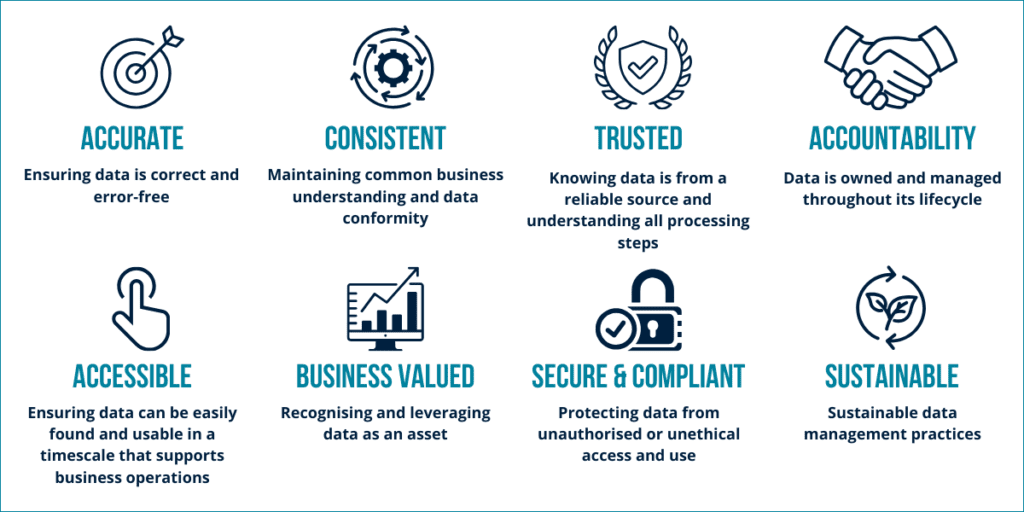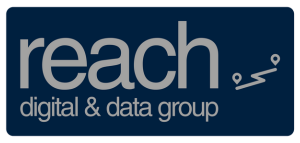You’ve heard of data, but you may be wondering, what is Business-Ready Data? What’s the difference?
At ReachDDG, we talk about Business-Ready Data as one of our keys to success. We use this term because it best describes what data professionals should strive to achieve with data.
Data should be seen as serving the business, just as any other asset or function within an organisation. It needs to be maintained at a level that allows the business to perform its functions well – no more, no less.
Data can undoubtedly open up many opportunities that will benefit a business. These need to be articulated clearly, and the case made for the investment to unearth and create value from that data. The days of ‘build it and they will come’ are largely gone. There needs to be a clear purpose and benefit assigned to investment in data.
Let’s compare data with another asset in the business: office desks. Office desks are strangely often recognised to a much greater extent as assets for a business than data (but that’s a topic for a future blog!). Office Desks serve a basic purpose, and investment is aligned to the business need. Rarely are more desks bought on an un-agreed assumption that more staff will be recruited, or that imported mahogany polished desks are what is required for the corner hot-desk area.
Data should be maintained at a level that serves the business. That is what we mean by Business-Ready Data.
Data Principles
What Business-Ready Data means in practice can be why data is sometimes seen as difficult to understand beyond basic data quality measures.
To help explain what we mean, we use the Data Principles below to define what Business-Ready Data means for you and explain what your business should expect from your data.
These principles start a data conversation: Where are your challenges? What’s the future vision? What are your priorities?
Each Data Principle can be linked to clear benefit statements that are relevant to your business. This helps build organisation-wide understanding and buy-in to any improvements needed.

ReachDDG Data Principles
Data and your business
Understanding the data needs across your business is important. What processes and systems does data support? Having the right capabilities in place to support new digital, data, or AI capabilities will be critical to the success of these services. You need to put the right fuel in a performance car for it to operate to the level you expect and, in the case of new systems, enable the business benefits to the fullest extent you were expecting.
Business-Ready Data will take time to develop. There are many building-related analogies out there, such as foundations and building a capability brick-by-brick; at Reach, we see creating a Business-Ready Data capability more like learning a language:
- When you’re learning a language, you start with basic words and phrases, moving onto forming simple sentences and understanding grammar rules. As you develop your vocabulary and ability to form sentences, you can start to engage in more complex conversations. The more you practice, the more vocabulary you understand, the more you learn from having conversations, and the more fluent you become.
- Building a data capability starts with gathering and organising your important data, understanding what you have and putting basic data management controls in place. Bringing consistent approaches and terminology gives data a common meaning. This consistency allows you to extract insights, inform decisions, and make predictions. You should start deriving value from your data as soon as possible, grow your datasets, create more sophisticated insights, and become more fluent in delivering value from your data.
This highlights several important points:
- As with learning a language, creating a Business-Ready Data capability takes time.
- If you skip the foundational steps of learning a language, you won’t have the ability to communicate effectively. If you jump straight into Analytics and AI without Business-Ready Data, you’ll get unreliable insights.
- Practice makes perfect when learning a language, and the same is true when incrementally building your data capability. Start speaking the language of data sooner rather than later and let the real-world “conversations” drive your data strategy forward. Pivot as needed to ensure you are delivering business value. This helps ensure your investment in data is strategically sound and delivers the highest possible return.
Reflecting on a previous point about maintaining Business-Ready Data to a level that allows the business to perform its functions well – no more, no less: if there are clear business benefits with being able to hold a fluent conversation then spend the time and hone your skills, but this will take time and investment. If all you need to be able to do is order a cup of coffee and ask for the bill, then that should be the target.
The data principles we discussed earlier, provide the vocabulary to help you develop your fluency in data.
As a final point on the analogy, always seek out opportunities to practice your language. Even in situations that don’t appear to offer much benefit – take regulatory obligations as an example. GDPR presented a great opportunity to speak the language of data and implement the capability to become more fluent. Environmental, Social and Governance (ESG) regulations may well provide a range of value-add opportunities from the new sources of data that will be opened up as a result of needing to report on ESG performance. Look at it as an opportunity to practice your language skills!!




